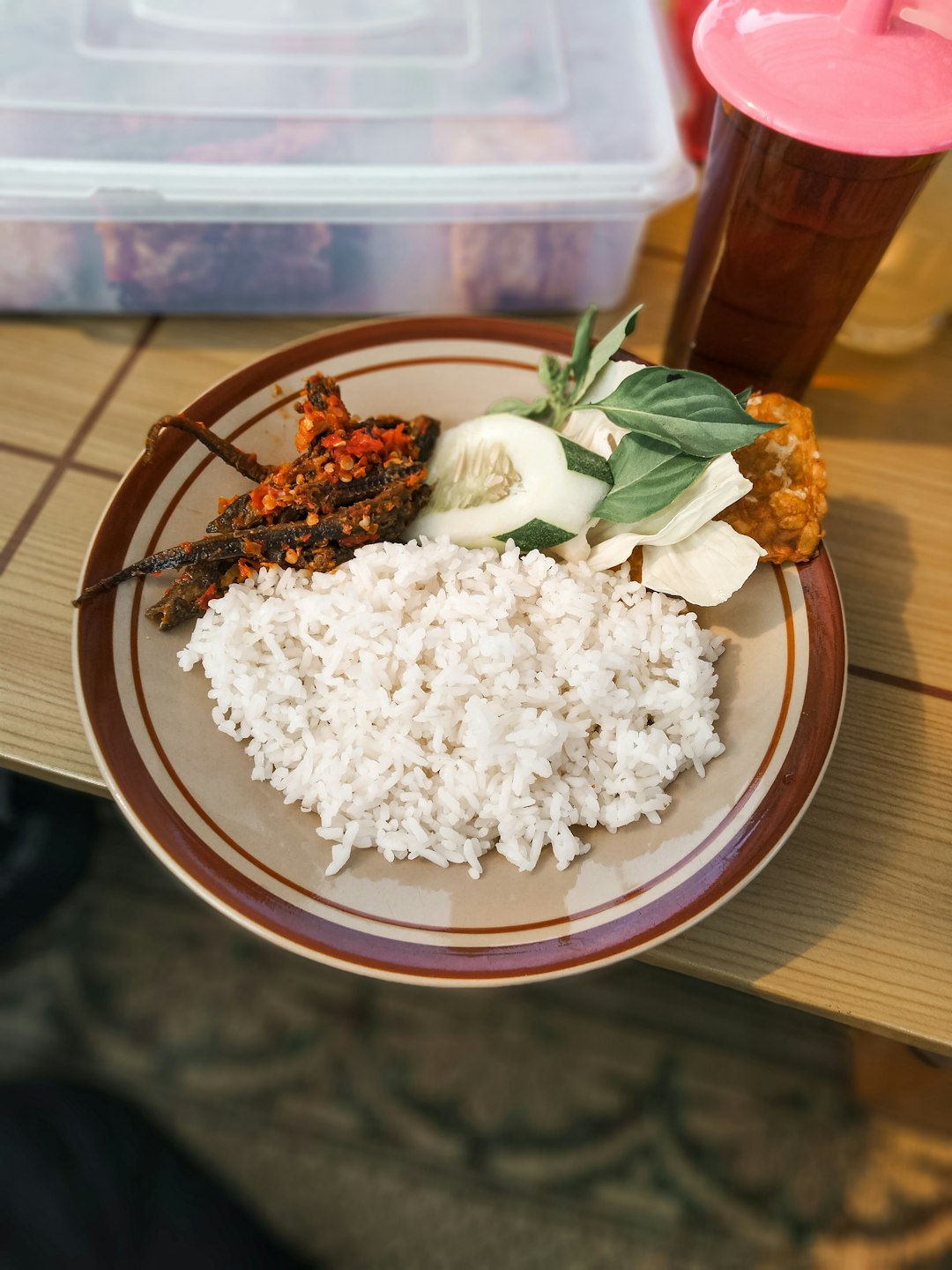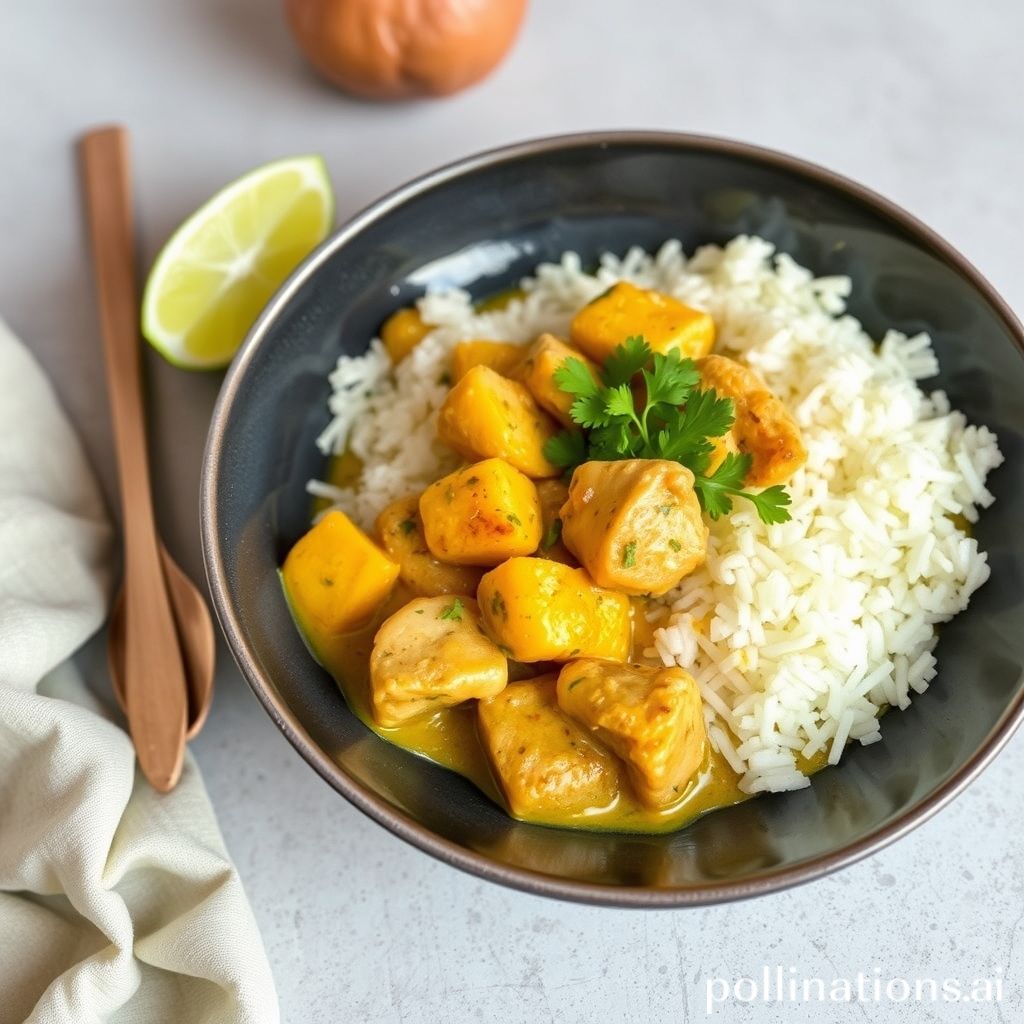Table of Contents
- Introduction
- Ingredients and essential spices for Coconut Curry Chicken
- Step-by-step preparation guide
- Cooking techniques for perfect texture and flavor
- Side dishes and accompaniments
- Variations and regional influences on Coconut Curry Chicken
- Health benefits and nutritional information
- Tips for using fresh herbs and spices
- Pairing Coconut Curry Chicken with beverages
- Conclusion
- Frequently Asked Questions
Introduction
Imagine embarking on a culinary adventure that takes your taste buds on a journey across diverse landscapes and cultures, all encapsulated within a single dish: Coconut Curry Chicken. This flavorful symphony of spices and textures is bound to captivate your senses and leave you yearning for more.
Ingredients:
- 1 tablespoon of coconut oil
- 1 pound of chicken breast, cut into cubes
- 1 onion, finely chopped
- 3 cloves of garlic, minced
- 1 tablespoon of curry powder
- 1 can (13.5 ounces) of coconut milk
- 1 cup of chicken broth
- 2 tablespoons of fish sauce
- 1 tablespoon of sugar
- Juice of 1 lime
- Salt and pepper to taste
- Fresh cilantro for garnish
With these ingredients, you’re ready to create a vibrant and aromatic coconut curry that is sure to become a staple in your kitchen repertoire.
The dance of fragrant spices and creamy coconut will surely elevate the humble chicken to an extraordinary gastronomic experience.
Ingredients and essential spices for Coconut Curry Chicken
Coconut Curry Chicken is a delightful dish that combines creamy coconut milk with an array of aromatic spices, creating a rich and flavorful experience. The ingredients you’ll need include boneless, skinless chicken pieces—preferably thighs for their tenderness—and coconut milk, which forms the base of the curry. Essential spices and herbs play a crucial role in imparting the dish’s characteristic taste.
Start with curry powder as the primary spice, which typically blends turmeric, coriander, cumin, and fenugreek. This mixture adds depth and warmth to the dish. Garam masala, a fragrant blend of spices like cinnamon, cardamom, and cloves, brings an extra layer of complexity. Fresh garlic and ginger are essential for their pungent and sharp flavors. Don’t forget about red chili powder or fresh chilies if you prefer some heat in your curry.
Complementing the spices, include aromatic vegetables such as onions and tomatoes for a balanced flavor profile. A squeeze of lime juice at the end can enhance the dish’s overall zestiness. Fresh cilantro leaves, used as a garnish, lend a fresh, vibrant finish to the coconut curry chicken, making it not just a meal, but a feast for the senses.
Step-by-step preparation guide
Preparing Coconut Curry Chicken is an enjoyable culinary adventure. Begin by gathering your ingredients: chicken breasts, coconut milk, curry powder, garlic, ginger, onion, bell peppers, and a touch of lime or lemon juice. Start by dicing the chicken into bite-sized pieces and season them with salt and pepper.
Next, heat oil in a large skillet over medium heat. Add chopped onions, minced garlic, and grated ginger, sautéing until fragrant. Stir in the curry powder to release its flavors, then add the chicken pieces, cooking until they are browned on all sides.
Pour in the coconut milk and bring the mixture to a gentle simmer. Allow the chicken to cook in this creamy bath until it is tender and cooked through. This usually takes about 15-20 minutes. Toss in the bell peppers in the last few minutes of cooking to keep them crisp.
Finish the dish with a fresh squeeze of lime or lemon juice to enhance the flavors. Season with additional salt and pepper to taste. Serve your delicious Coconut Curry Chicken over rice or with warm naan bread for a satisfying meal. Enjoy the rich, aromatic blend of spices and coconut that make this dish a household favorite.
Cooking techniques for perfect texture and flavor
Achieving the perfect texture and flavor in Coconut Curry Chicken is a blend of art and science. To begin with, selecting the right cut of chicken is crucial; using thighs instead of breasts helps retain moisture and provides a tender bite. Marinating the chicken in spices and coconut milk for at least an hour can infuse deep flavors and ensure a succulent texture.
When cooking, it is important to use a heavy-bottomed pan or a Dutch oven for even heat distribution. Begin by searing the chicken at medium-high heat to lock in juices and create a caramelized exterior. Then, remove the chicken temporarily while you sauté onions, garlic, and ginger to create a base aromatic layer. The addition of spices like turmeric, cumin, and coriander toasted gently enhances their essence.
Reintroduce the chicken to the pan and simmer with the coconut milk mixture. Cooking on low heat until the chicken is tender allows the flavors to meld beautifully. To boost the texture, incorporate vegetables such as bell peppers or snap peas towards the end of cooking, maintaining their crunch. Finishing with a splash of lime juice or a sprinkle of fresh cilantro brightens the dish, balancing richness with a refreshing zest.
Side dishes and accompaniments
When savoring a delicious plate of Coconut Curry Chicken, selecting the right side dishes can elevate the dining experience and complement the rich flavors of the curry. A popular choice is steamed jasmine or basmati rice, which provides a fragrant and fluffy base to soak up the creamy sauce. For those seeking a healthier alternative, cauliflower rice can make an excellent low-carb substitute.
Add a refreshing contrast to the spice by including a cucumber salad, seasoned with a tangy lime dressing. This not only cools the palate but also adds a crisp texture to the meal. Another option is naan bread, ideal for scooping up the savory curry.
The addition of a vegetable dish, such as stir-fried green beans or roasted Brussels sprouts, can enhance the meal with added nutrition and a variety of textures. For a touch of sweetness, consider serving a mango chutney on the side, which pairs beautifully with the curry’s savory notes.
Incorporating these accompaniments not only rounds out the meal but also ensures a balance of flavors that create a satisfying and complete dining experience.
Variations and regional influences on Coconut Curry Chicken
Coconut Curry Chicken is a versatile dish found in many regional cuisines, each bringing its unique flavors and culinary traditions. In South India, this dish is often enriched with an aromatic blend of spices like mustard seeds, curry leaves, and tamarind, delivering a tangy and spicy profile. The curry is usually thickened with fresh coconut milk, resulting in a creamy texture.
Meanwhile, in Thai cuisine, the emphasis is on a balance of sweet, salty, sour, and spicy elements. Thai coconut curry chicken typically features ingredients like lemongrass, kaffir lime leaves, and galangal, and is often finished with a splash of fish sauce and a sprinkle of fresh cilantro. The use of red, green, or yellow curry pastes allows for further variations in flavor and color.
In the Caribbean, coconut curry chicken takes on a different character, highlighting the region’s love for robust spices. Jamaican versions might include allspice, thyme, and Scotch bonnet peppers, providing a significant heat level. Here, the chicken is sometimes marinated in a jerk seasoning before being cooked in the coconut curry base, offering a smoky and spicy taste.
These regional influences show how Coconut Curry Chicken adapts to local ingredients and tastes, yet consistently remains a beloved dish around the world.
Health benefits and nutritional information
Coconut Curry Chicken is not only a flavorful and aromatic dish but also offers several health benefits and nutritional advantages. At the core of this dish is chicken, an excellent source of high-quality protein which is crucial for muscle growth and repair. It also provides essential vitamins and minerals like B vitamins, which are vital for energy production, and selenium, a powerful antioxidant.
The addition of coconut milk enhances the dish’s nutritional profile. Coconut milk is rich in medium-chain triglycerides (MCTs), which are believed to be easily digestible and can provide a quick energy boost. Additionally, it contains lauric acid, known for its antibacterial and antiviral properties, potentially aiding in enhancing the immune system.
Curry spices such as turmeric, cumin, and garlic not only contribute to the dish’s vibrant flavor but also add health benefits. Turmeric, for instance, contains curcumin, a compound known for its robust anti-inflammatory and antioxidant properties. Meanwhile, ingredients like garlic and ginger may help reduce inflammation and support heart health.
Together, these ingredients make Coconut Curry Chicken not just a culinary delight but a meal that supports a healthy lifestyle.
Tips for using fresh herbs and spices
Using fresh herbs and spices can significantly enhance the flavor profile of Coconut Curry Chicken, adding layers of complexity and richness. When incorporating these aromatic elements, it’s important to understand the correct usage to fully capture their essence.
First, always opt for fresh over dried herbs and spices for a more vibrant taste. Fresh herbs such as cilantro, basil, or mint should be added towards the end of cooking. This helps retain their delicate flavors and aromas, preventing them from becoming bitter or losing potency due to prolonged heat exposure.
When it comes to spices, lightly toast whole spices like cumin, coriander, and mustard seeds in a dry pan before grinding them. This simple step releases essential oils, amplifying their aromas and flavors. For coconut curry, fresh ginger and garlic are indispensable; grating them ensures their juices infuse into the curry smoothly, providing depth and warmth.
Another tip is to chop herbs just before use to prevent browning and to preserve their fragrance. Store any leftover fresh herbs in the refrigerator wrapped in damp paper towels and placed in an airtight container to maintain freshness.
Finally, always taste and adjust seasoning throughout the cooking process to achieve the perfect balance of flavors.
Pairing Coconut Curry Chicken with beverages
Pairing beverages with Coconut Curry Chicken can enhance the dining experience by complementing the dish’s rich and complex flavors. A popular choice is a chilled white wine like Riesling or Sauvignon Blanc. These wines offer a crisp, refreshing contrast to the creamy coconut milk and the aromatic spices, allowing the dish’s flavors to shine without being overshadowed.
For those who prefer beer, a light lager or a wheat beer can also be an excellent match. The effervescence and subtle sweetness of these beers serve to cleanse the palate, making each bite of the curry feel as fresh as the first.
Non-alcoholic options include a sparkling water with a splash of lime, creating a zesty counterbalance, or a chilled iced tea with a hint of ginger, which mirrors and harmonizes with the curry’s spice profile. For a more traditional approach, consider pairing the dish with a delicate jasmine or green tea. These teas offer a mild, earthy flavor that complements the tropical essence of the coconut curry, making the meal both satisfying and refreshing.
Conclusion
Embarking on the journey of crafting Coconut Curry Chicken is not just about indulging in a culinary delight; it’s about embracing a vibrant tapestry of flavors that transport you to the tropics with every bite. As you explore the art of balancing aromatic spices with creamy coconut textures, you unlock a world of possibilities, making every meal an adventure. Whether you’re savoring it over a bed of fragrant jasmine rice or pairing it with a crisp cucumber salad, Coconut Curry Chicken promises to be a feast for both the palate and the soul.
For those eager to expand their culinary repertoire and discover more ways to elevate their everyday chicken dishes, ‘The Chicken Bible: Say Goodbye to Boring Chicken with 500 Recipes for Easy Dinners, Braises, Wings, Stir-Fries, and So Much More’ is a must-have. Packed with creative recipes and innovative cooking techniques, this book is your ultimate guide to transforming humble chicken into gourmet meals. To embark on your flavorful journey, purchase your copy today by visiting this link and take the first step towards culinary mastery!

